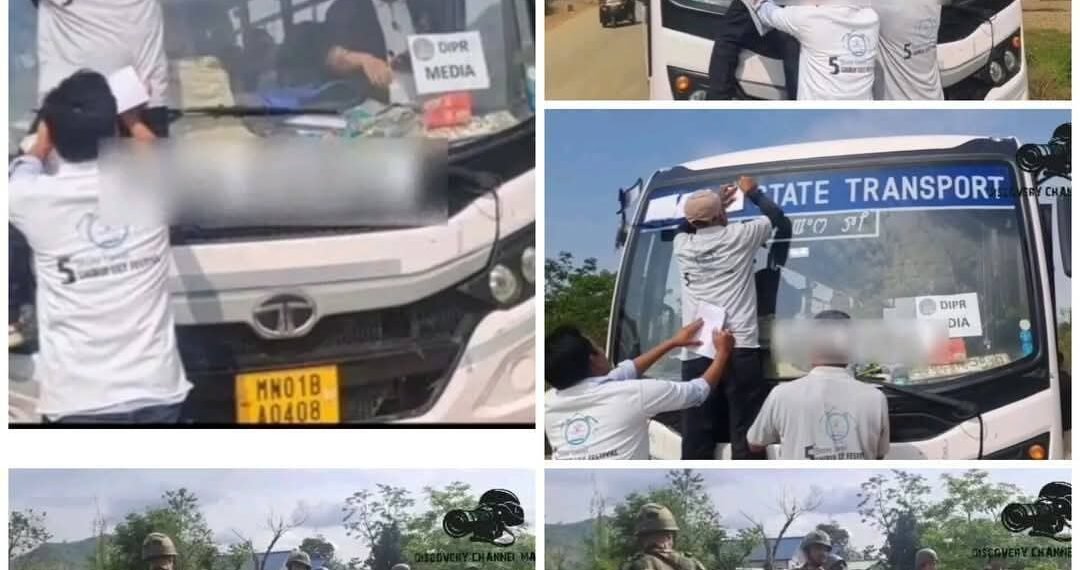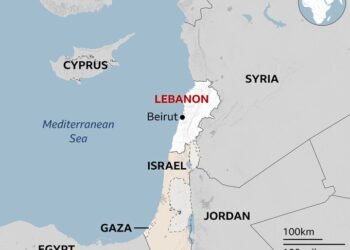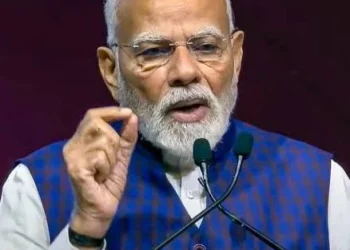Editor’s Note: As part of our ongoing commitment to serve as an advocacy platform for peace in Manipur, we continue to welcome opinion pieces from all communities. We encourage individuals to use this space to express their perspectives with sincerity and responsibility. We urge contributors to refrain from language that could be interpreted as inciting violence or hatred. In line with this initiative, we present a write-up by Dr. Seilen Haokip, spokesperson of the Kuki National organisation (KNA). Please mail your write-up at: novinkn@gmail.com. Thank you, Navin Upadhyay
 BY Seilen Haopkip
BY Seilen Haopkip
Another week, another episode in the theatre of ethnocentric zeal that has come to define valley-based Meitei civil society organizations like COCOMI. This time, the spark? A routine security measure—the removal of the word “Manipur” from a bus that was ferrying journalists through a Buffer Zone on May 20. Government had set up the Buffer Zones following the 3 May 2023 state-sponsored ethnic cleansing and genocide of Kuki Zo to prevent further escalation. The bus was enroute to the Shirui Lily Festival in Ukhrul, passing through a sensitive area that falls within Kuki-Zo territory.
But for COCOMI, this mundane precaution to remove the signage for obvious security reasons was a direct blow to their supreme ego, fed by misconception that present-day Manipur is millennia old, and a “symbolic attack” on the “idea of Manipur.” What follows is a breathless escalation of demands—apologies from the Governor, resignations of the Chief Secretary, DGP, and the Security Advisor. All this for a flex board. One wonders: if they had displayed even half this outrage when women were stripped and paraded or when 260 lives were lost last year, perhaps Manipur might have found a path to reconciliation. But selective pride seems to be the currency of the day.
For days, Imphal saw a spate of flareups. Protesting Meitei people ripped off signages bearing INDIA in Government offices, a roadblock necessitated a helicopter to take the Governor from the airport to Raj Bhavan, which the protesters tried to break in. Gazing an opportunity to gain political mileage, former chief minister, N Biren Singh submitted a memo to the Governor urging him to initiate identification of illegal immigrants. Biren’s rationale based on historical narratives have been found wanting and the data concerning Kuki Zo immigrants, contradictory to his claims.
The “Idea of Manipur”: A Myth of Inclusivity
COCOMI’s righteous indignation hinges on the claim that the name “Manipur” embodies an inclusive identity. Yet, their actions consistently betray a psychology of exclusivist ownership. Their reaction to the removal of a single word exposes the hollowness of their inclusivity rhetoric. The irony is rich: an organization that has tacitly or overtly supported the cultural domination of the hills by the valley is now crying foul over what it perceives as an “insult” to state integrity.
Let us be clear: the incident took place in Kuki-Zo territory, not in some ancestral core of Meitei civilization. That the signboard became a problem there is telling in itself. The truth remains that large swathes of what is today “Manipur” were never part of the so-called two-millennia-old “Kangleipak.” The attempt to overwrite tribal histories and lands with a singular, valley-centric narrative is exactly why communities are demanding constitutional separation.
 READ: Sorry, Can’t Touch Army Over Signage Row — AFSPA Offers Legal Shield
READ: Sorry, Can’t Touch Army Over Signage Row — AFSPA Offers Legal Shield
From Linguistic Chauvinism to Armed Dominance
The cultural arrogance of COCOMI and its ilk goes beyond political overreach. This is the same group that—while waving the Indian tricolor at press conferences—has upheld a two-decade-long ban on Hindi films across Manipur. That’s right. In a state governed by the BJP, a party that prides itself on nationalism and promotion of Hindi, not a single Hindi movie has been allowed on cinema screens. So much for “national pride.”
One must ask: what kind of nationalism allows room for such linguistic fascism? Or is nationalism only a slogan when convenient, while the real allegiance lies with an imagined ethno-state rooted in a glorified past?
The Deafening Silence on 3 May
The hypocrisy grows starker when viewed against the events of 3 May 2023. Over 260 people were killed. 60,000 displaced. Nearly 7,000 homes and hundreds of churches were burned. Did any Meitei civil society organization, including COCOMI, demand justice? Not once.
Instead, they silence, vilify, or threaten anyone who calls for accountability. When two Kuki-Zo women were stripped and paraded, it was Meitei women groups like Meira Paibi who justified the horror. When children were killed and their homes set ablaze, where was this so-called “cultural pride”?
And yet, today, they claim the removal of a signboard is an attack on Manipur’s soul.
 READ: Signage Row: Governor Skirts Blame, Army Dragged into Debate
READ: Signage Row: Governor Skirts Blame, Army Dragged into Debate
The Truth About Territorial Integrity.
The Meitei elite constantly speak of “territorial integrity” as if the borders of present-day Manipur were handed down by divine ordinance. History, however, tells a different story. The state of Manipur, as we know it, is a colonial construct. After becoming a British protectorate in 1824, its borders were drawn up over decades:
North in 1873; South in 1900; East in 1834; West in 1832
The so-called “unity” of valley and hills is, therefore, a postcolonial convenience—not an ancient truth.
The Meitei valley and the hill tribes have always existed as opposites—politically, culturally, and administratively. Yet only one group continues to demand “unity,” not out of harmony, but to maintain lopsided access to power and state resources. The hill tribes, whether Kuki-Zo or Naga, are seeking only what the Constitution allows—self-governance and protection under Article 3.
Time for Constitutional Reckoning
COCOMI’s noise over a bus board distracts from the real conversation that India needs to have about Manipur: the state’s colonial design has failed. Administrative convenience can no longer mask the structural imbalances and cultural chauvinism at play.
It’s time India takes seriously what the founding fathers of its Constitution envisioned—justice, equality, and autonomy for all ethnicities and communities. Kuki Zo and Naga must not be held hostage by the insecurities and supremacist delusions of one community alone.
Let them keep their signboards. We are fighting for our future.














